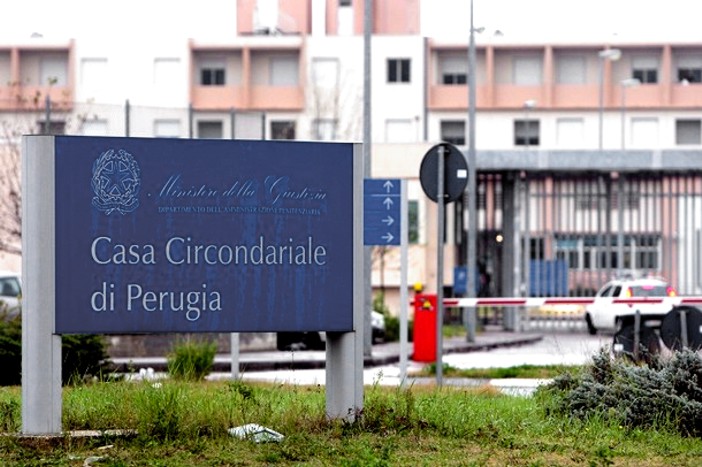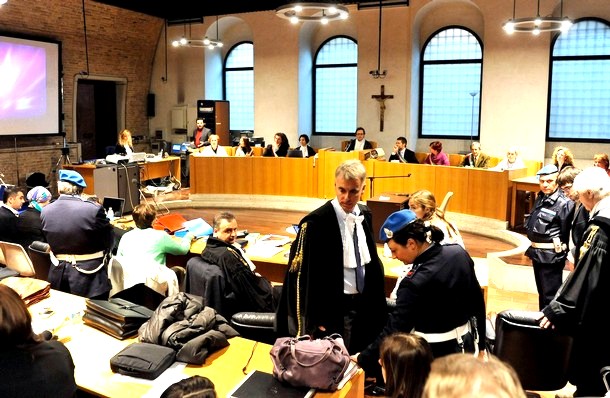
Category: Hellmann 2011+
Tuesday, December 15, 2009
Another Prominent US TV Commentator Sees The Evidence Pointing Pro-Guilt
Posted by Peter Quennell
Three highly influential women commentators in the US are now forcefully arguing pro-guilt on TV.
They are legal talk-show host Jeanine Pirro (video below), legal analyst Wendy Murphy, and now conservative political commentator Ann Coulter. All three proceed from a deep understanding of the hard evidence.
The bleach purchases mentioned here were never actually proven, though Knox was seen in the bleach area of the Conad supermarket early the day after (when she claimed to be asleep), and in both Knox’s and Sollecito’s apartments, bleach did appear to have been used.
Otherwise, pretty good.
By the way, Ann Coulter’s new book “Guilty” that you see promoted on the video is not about Amanda Knox. It is actually about liberals being too soft on defendants. To ourselves the large and rapidly growing community of those pro-justice-for-Meredith and pro the verdict and sentence seems to cross all political boundaries.
We’d say the common factors here are strong logic, hard work in really getting into the evidence (a lazy Peter Van Sant obviously hasn’t), a reluctance to be snowed, and a deep humanity toward the real victim.
Meredith. In case the FOA campaign ever forget.
Andrea Vogt Has A Long Cool Take In The Seattle PI On Where Things Stand
Posted by Peter Quennell
Please click above for the report. This one is highly worth reading in full.
Apart from the highlights quoted below, the report touches on Amanda Knox, now semi-resigned in her cell, on the very extensive nature of the evidence, and on the pro-defendant stance of the Italian justice system.
Italian reactions to the commentaries of Timothy Egan and others not very immersed in the evidence are also reported on.
According to Andrea Vogt, in many ways, things are not, at least not yet, so very different from before. The campaign goes on, if now sensibly a lot more subdued.
We do however continue to see large numbers coming by TJMK to read here at length (especially now from Seattle) and according to our emails the shock-factor of the actual evidence is often quite considerable.
And the judges’ long and very detailed judgment report out early next March at the latest may prove to be a definitive bottom line, as Judge Micheli’s report was after the Rudy Guede trial.
It is that objective and exhaustive judgment statement that will define what the appeal is about.
1) On Italian reactions to the charges of anti-Americanism
On Monday, another salvo was fired at Sen. Maria Cantwell, D-Wash., from Italy as the Italian president of the Italy-USA Foundation, an association that works closely with the U.S. Embassy in Rome, released a statement on the foundation’s website describing his Sunday prison visit with Knox and harshly criticizing Cantwell’s comments about the Italian justice system.
“I believe it is out of place to insert anti-Americanism, as stated by American Sen. Maria Cantwell, into a situation like this that can be easily exploited,” wrote Rocco Girlanda, president of the Italy-USA Foundation, in a news release posted on the foundation’s website. “In my opinion it would have been more correct to avoid creating controversy or alleged affairs of the state that are totally outside the official declarations of the parties and of their respective governments.”...
On Monday, Cantwell’s spokeswoman did not repeat the complaints that the senator has made but said her office will continue to monitor the Knox case….
Cantwell’s questioning the fairness of the Italian justice system has raised the ire of many on this side of the Atlantic….The handful of American journalists inside the courtroom regularly attending the trial did not witness the “anti-Americanism” of which Cantwell spoke.
2) What really mattered to the jury in their deliberations and the length of the sentence
Jurors said they believed the forensic evidence, as reported last spring here and here and not the defense’s attempts to dismiss the evidence at trial and during closing arguments.
The forensic evidence was presented in open court and subject to cross-examination and robust debate. Legal scholars say Knox is lucky she didn’t get a longer sentence….
The jurors, polled and interviewed after the verdict, said they were not split on the question of innocence or guilt but rather on the question of whether she should get life in prison or less.
3) An Italian expert on the justice system notes that this was a fair trial
“This is the simplest and fairest criminal trial one could possibly think of in terms of evidence,” said Stefano Maffei, lecturer in criminal procedure at the University of Parma.
“There were 19 judges who looked at the facts and evidence over the course of two years, faced with decisions on pre-trial detention, review of such detention, committal to trial, judgment on criminal responsibility. They all agreed, at all times, that the evidence was overwhelming.”
The court’s sentence of Knox and Sollecito was mild, Maffei said, with the jury taking into account the facts of the crime along with her clean criminal record.
He noted that a similar reduction in sentence did not happen with co-defendant Rudy Guede, even though he agreed to a fast-track trial, which reduced his sentence from life to 30 years.
4) The very extensive nature of the evidence presented.
Often lost in the debate over Knox’s guilt is the evidence presented at trial. Some of it was strongly disputed, and some likely forgotten by those in America trying to keep up on a trial that took place a couple of days a week over several months with long breaks of no proceeding at all.
Jurors, interviewed after the verdict, said they were convinced by the forensic evidence and were unanimous on the question of guilt or innocence, though they made a point of noting they did not believe Kercher’s murder was premeditated.
[In Andrea Vogt’s full report in the Seattle PI (click through above) there follows an excellent bullet-point list of the evidence.]
5) The many pro-defendant protections built into the Italian justice system
For historical and political reasons unique to Italy, the country has a justice system with an extraordinary number of protections for the accused, more than many other European nations.
“These criticisms we are hearing from the United States are so strange,” said Stefania Carnevale, an assistant professor of criminal procedural law and prisoner’s rights at the University of Ferrara.
“They leave me perplexed because the critique seems to be about the behavior of the police or the prosecutor or small details of this single trial, not the system as a whole. If there are errors in a trial, the Italian system has rigorous checks and balances in place to correct such mistakes, and guarantee an appeal.”
Knox may have a number of salient points on which to base her appeal, most notably several pieces of contested forensic evidence and the fact that she was questioned without an attorney present despite being treated as a suspect by Perugian police.
The presumption of innocence is so strong in Italy that under criminal procedural law, Knox is still not considered a convicted murderer, and won’t be, until she has been found guilty through all phases of the process: Court of Assize, where the jury just made a decision; the Appellate Court of Assize; and the Court of Cassation.
Friday, December 04, 2009
The Ruling Deliberations: Updates On Any New Developments Today Friday
Posted by Peter Quennell

[Above: the main entrance of the court complex]
Update 1: After a brief hearing in the courtroom this morning the judges and lay judges commenced their deliberations on a ruling around mid-morning.
Update 2: The Croydon Guardian reports the departure of Meredith’s family from London for Rome and then Perugia.
The parents of murdered Coulsdon student, Meredith Kercher, are due to arrive in Italy for the verdict of her murder trial.
Arline and John Kercher flew to Perugia today to see the jury deliver its verdict on whether or not Amanda Knox and Raffaele Sollecito were involved in their daughter’s murder.
Update 3: The BBC has a brief simulation of the police finding Meredith in her room on the day.
Update 4: The Independent devotes a report exclusively to the Kercher family’s two-year ordeal.
Update 5: Today for the first time ever, Meredith’s family may get to meet face-to-face Raffaele Sollecito’s family and Amanda Knox’s family. During Guede’s trial in October 2008. Meredith’s family were in court, and Knox’s family apparently observed the courtroom from a hillside up above.
Update 6: A video of Amanda Knox making her final statement in Italian has been added to the post below on the wrapping-up of the summations yesterday.
Update 7: Sky News has just posted a written report and a video report.
Update 8: La Notizie is saying that the ruling, barring unforseen circumstances, should come tonight. On Perugia Murder File forum (link just below) they are saying that might not bode well for the defense.
Update 9: Eight PM in Perugia now, and the judges’ deliberations on their rulings continue. Meredith’s family are waiting at their hotel now, as are Amanda Knox’s and Raffaele Sollecito’s families. No further news leaking out. Everybody tense.
Update 10: Nine PM in Perugia and informal word from Perugia is that the rulings are expected tonight some time after midnight, maybe 4 or 5 hours away. Knox and Sollecito are right now back in their cells in Capanne prison.
Update 11: The AGI News Service is reporting this below.
It has been now more than 8 hours since the Court of Assizes of Perugia began in closed session to reach the verdict against Amanda Knox and Raffaele Sollecito. Deliberating are the presiding judge, Giancarlo Massei, 55 years old, head of the criminal division of the court in Perugia, the judge Beatrice Christians, 52 years old, and 6 lay-judges, three men, 35 , 38 and 57 years… and as many women, 37 43, and 51 years, all residents in the area of jurisdiction of the court in Perugia. (the alternates were set free - ed.)
Tuesday, December 01, 2009
Germany’s Der Spiegel Posts An Analysis Of The Case
Posted by Peter Quennell
Please click above for Der Spiegel’s analysis in German
The case is being followed closely in Germany. Many Germans take vacations in Italy and they know the country well, and of course Rudy Guede was arrested there. Reporting is good, and TJMK see a number of hits daily from Germany.
With thanks to Has-Georg for the heads-up..
Andrea Vogt Asks Some Useful Questions Concerning The Legal Process
Posted by Peter Quennell
Click here to read all of this well-researched report on the Seattle P-I website.
After presenting an overview of the system similar to those posted here by Nicki and Commisario Montalbano Andrea Vogt asks two experts on the system these questions.
Do jurors have to find Knox guilty beyond a reasonable doubt?
Yes. The concept of proof beyond a reasonable doubt has long been a part of Italy’s justice system. It was formalized and passed into law in 2006.
Knox’s defense lawyer Luciano Ghirga said his team will remind jurors that, even after more than 40 hearings, everything is still in doubt.
The court’s ruling (which is not called a verdict in Italy) is made by an eight-member jury: six laymen and two professional judges. They will vote, and the majority rules. In the case of a 4-4 tie, acquittal overrules.
Could Amanda Knox have plea bargained?
Knox maintains her innocence.
However, while not completely analogous to plea bargaining, Italy does have a similar alternative to trial, also a part of the 1988 reforms. The alternative is not applicable for serious crimes, such as murder, punishable by more than five years in prison.
Suspects who cooperate fully with the police, however, may become eligible for a bundle of mitigating circumstances that would lower prison sentences. A judge may also choose to apply aggravating circumstances to increase a sentence.
Negotiation on the evidence—in which both sides agree what can be admitted—is also available when defendants choose a fast-track trial, as did Rudy Guede, sentenced to 30 years last year for his role in the case for which Knox is on trial. Guede is appealing his conviction.
Why does the figure of prosecutor seem so powerful in Italy?
The prosecutor is a powerful figure in Italy connected to the judiciary, not elected or appointed. While there is a career separation between judges and prosecutors, the qualifying examination and training are common, That has made judges and prosecutors close both culturally and professionally.
In the U.S., prosecutors are appointed in federal system and typically elected in the state system, hence it is common to hear cases referred to as The State vs. X.
In Italy, protections were put in place precisely to prevent the state from pursuing or persecuting, hence the independence of prosecutors.
As a result, prosecutors haven’t shied away from taking on politicians. Italian Premier Silvio Berlusconi, for example, faces a series of criminal procedures in the courts.
That independence , some argue, is precisely the protection needed as a check against government power, and without it, corruption could not be exposed, said Maffei. But others argue that prosecutors wage their own political battles. using their independence to attack political opponents.
Another major difference: the prosecutor supervises the investigation rather than letting police handle it.
Further, he or she also has no discretion over the decision to seek charges. There is a constitutional principle of mandatory prosecution. If there is sufficient evidence to build a case against a defendant, a prosecutor must seek an indictment.
In the U.S. prosecutors can and do drop cases for such reasons as workload or because the defendant has agreed to help with a criminal investigation.
Was it legal for Knox not to have an attorney present when police questioned her?
Yes and No.
Amanda Knox’s interrogation falls into a gray area of the law because she came voluntarily to the police station and was being interviewed in the beginning as someone who could become be a witness, not a suspect.
Then, in the course of questioning by police in November 2007, she blamed Patrick Lumumba for the slaying, and said she was present at the scene of the crime. Lumumba was innocent. Knox has since denied she knows anything about the slaying and says she wasn’t in the flat the night Kercher was killed. Limumba is suing Knox for slander.
The law is very clear: A suspect must not be interrogated without a lawyer.
Once a suspect, an interrogation must be interrupted, the suspect read his or her rights to remain silent and be provided a lawyer. Italian law does not allow waiver of one’s right to counsel. Even if a suspect doesn’t want a lawyer, the authorities are required to appoint one.
If a suspect’s freedom of movement is hindered, the interrogation must be videotaped.
In Knox’s case, a video or audio recording of the entire police interrogation (authorities have denied that any such recordings exist) could identify when police began treating Knox as a suspect and what procedures were followed.
In fact, Italy’s Supreme Court has already said that some of her early statements may not be used against her because they were made without an attorney present.



